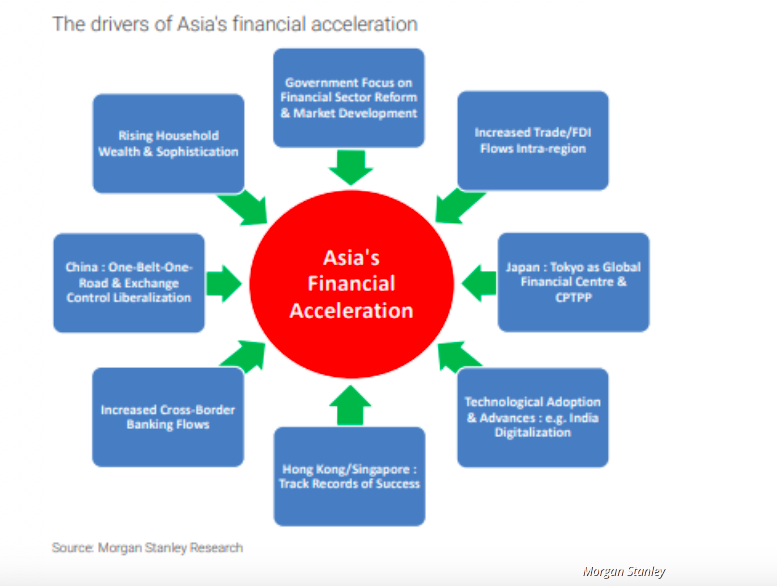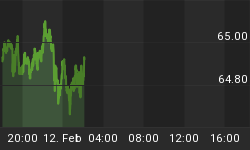Set to double in 10 years, the Asian stock market will overtake all others, says Morgan Stanley, in a rapid growth phase that will put it $14 trillion ahead of North America.
Led by China/Hong Kong and India, Asia’s total stock market capitalization will surge from $29 trillion today to $56 trillion by 2027, according to a 51-page Morgan Stanley report.
In that same period, U.S. and Canadian stock markets combined are expected to grow to $42 trillion.
While China and Hong Kong should be the biggest sources of growth, according to Morgan Stanley, India’s stock market will be the fastest-growing and is expected to surpass $6 trillion.
The rapid growth for Asian equity markets will be driven by strong GDP growth, the next stage of market development, regional financial integration and financial sector reforms.

(Click to enlarge)
Not only is the cost of equity in Asia expected to decline by 150 basis points, but more households are set to jump on the market, moving away from bank deposits.
Asia household bank deposits versus equity investments are much higher than in North America, where bank deposits are at only 14 percent, compared to 53 percent in Japan and 44 percent in the rest of Asia.
“We see pension funds, mutual funds, insurance, and equity and debt capital markets as primed for accelerating growth,” Morgan Stanley said. “This will be driven by rapidly rising household wealth, demographic change, structural reform, technological change, and the development of institutional investment capacity.”
Insurance assets are expected to skyrocket in Asia, reaching $20 trillion by 2027—a major leap from only $7 trillion in 2016.
The Asian dollar bond market is already nearing the $1-trillion mark, and its upward journey isn’t likely to change direction, while foreign-currency bonds comprise 3.3 percent of Asia credit (without Japan). That’s up from 1.7 percent in 2007. Comparatively, Europe’s is at 6 percent.
For investors, the Asian stock market catch-up is a prospective bonanza.
Investors will be eyeing financial companies with cross-border banking, such as AIA Group (Hong Kong), Bank of China Limited, CITIC Securities Co. (China), Macquarie Group Limited (Australia), DBS Group Holdings (Singapore), Sumitomi Mitsui FG (Japan), among others. Related: Aston Martin Challenges Rolls Royce Ahead Of Possible IPO
Morgan Stanley also noted that the use of the Chinese yuan in the global financial system will continue to lag behind, despite major financial market development over the next 10 years.
Predicting that the yuan could move to fourth place in global foreign-exchange trading during this period, Morgan Stanley said, it is not likely to challenge the yen for the top slot in a decade.
A 2018 World Bank report puts global economic growth at 3.1 percent his year, with China, East Asia and Asia-Pacific the fastest-growing regions. The International Monetary Fund (IMF) says emerging and developing Asia will grow around 6.5 percent this year and next, accounting for over half of world growth.
According to Bloomberg, China’s economy should overtake the Eurozone in terms of size this year, with Chinese GDP growth forecast to hit $13.2 trillion in 2018, while the combined Eurozone figure is $12.8 trillion.
By Charles Benavidez for Safehaven.com
More Top Reads From Safehaven.com:

















